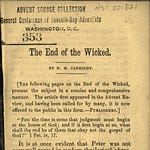Easter-tide is nearly here again. The shop windows are all aglow with their gaudy display of Easter bonnets, Easter suits, and Easter eggs. Easter post cards are on sale at every drug-store and news stand. As I pass by and behold the devotion of modern worshipers, I wonder how many are aware of the true origin of Easter.
Hear what Charles Temple has to say in Pagan Counterfeits in the Christian Church, pages 42-43:- “The ancient pagans, with entire unanimity, worshiped one and the same great goddess of sensual love.”
The Babylonians and Phonecians called her 'Astarte;' the Egyptians, 'Isis;' the Greeks, 'Aphrodite; the Romans. 'Venus, Flora, Ceres,'. Our Pagan-English ancestors called her 'Eostre,' and the Saxons by the similar name,“Easter.”
She also had many other names, among which were the 'Ashtaroth' of the Jews and Zidonians, and 'Diana' of the Ephesians." The Easter egg was likewise conceived in paganism.
“The Hindu fables celebrate their mundane egg as of a golden color. The people of Japan make their sacred egg to have been brazen. In China, dyed or painted eggs are used on sacred festivals, even as in this country. In ancient times, eggs were used in the religious rites of the Egyptians and the Greeks, and were hung up for mystic purposes in their temples. From Egypt these sacred eggs can be distinctly traced to the banks of the Euphrates.”
Here is one story of its origin:
“An egg of wondrous size is said to have fallen from heaven into the river Euphrates. The fishes rolled it to the bank, where the doves, having settled upon it, and hatched it, out came Venus, who afterwards was called the Syrian Goddess, that is, Astarte.“ Hyginus, Fabuloe, pages 148, 149.
The Roman Church adopted this mystic egg of Astarte, and consecrated it as a symbol of Christ's resurrection.
Following is part of a prayer which Pope Paul V taught his superstitious followers to use on Easter:
“Bless, O Lord, we beseech thee, this thy creature of eggs, that it may become a wholesome sustenance unto thy servants, eating it in remembrance of our Lord Jesus Christ,” Scottish Guardian, April, 1844.
Like the Sunday, Easter had its origin in ancient Babylon.











Share this post